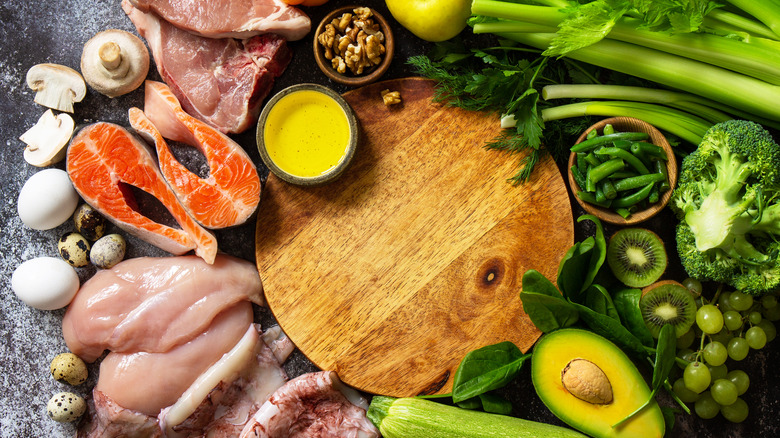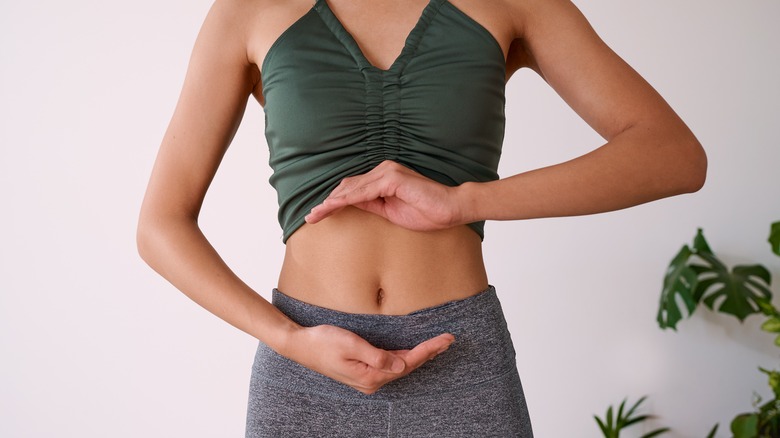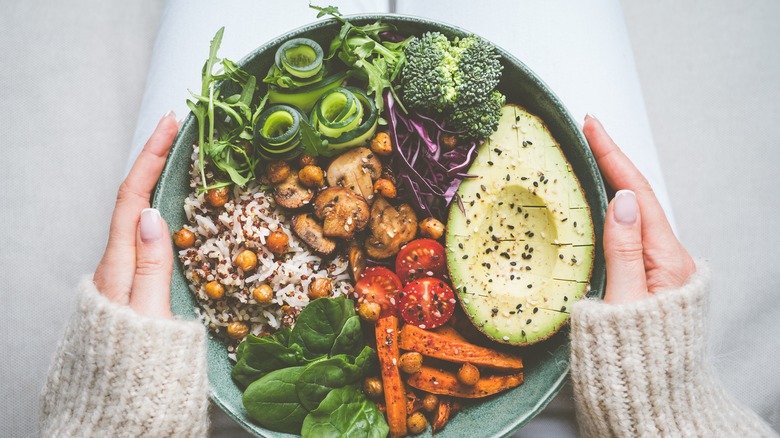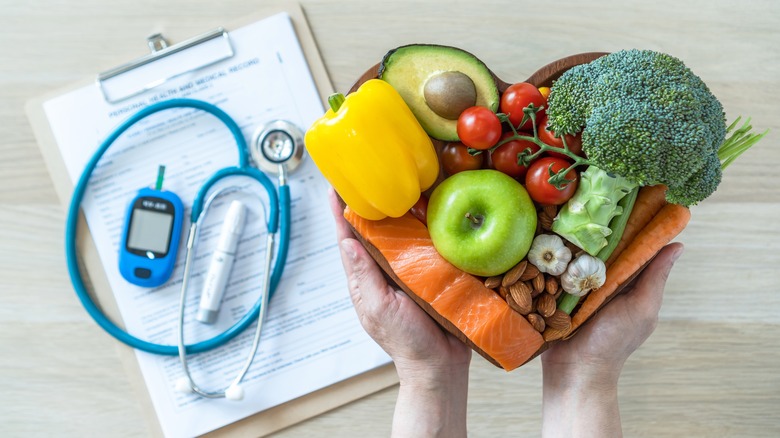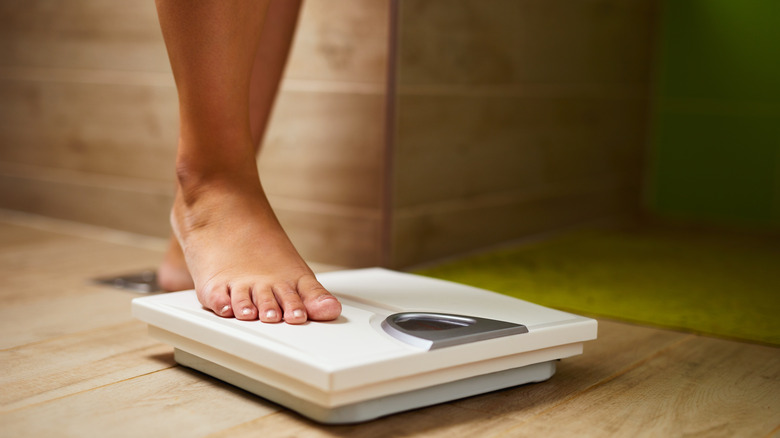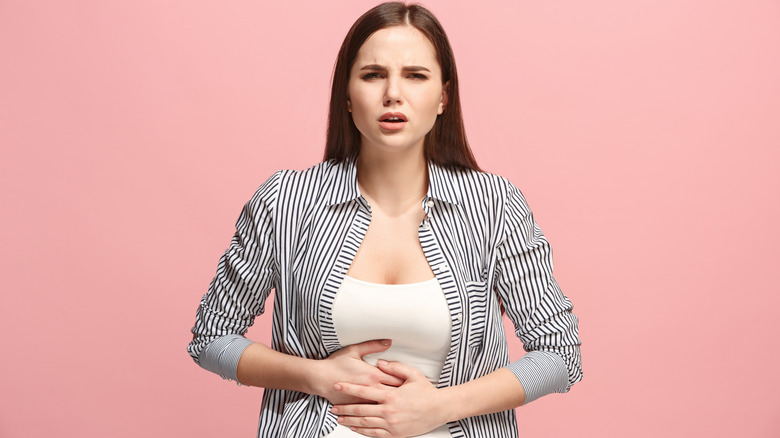When You Stop The Keto Diet, This Is What Happens To Your Body
The keto diet took the world by storm a couple of years ago. You've probably seen hundreds of progress pictures on social media from people who tried the diet and had success with it. The reason this diet delivers such incredible results is because it focuses on cutting out carbs and replacing them with foods that are high in fat (via Healthline). This then forces your body to start burning fat for fuel, a state also known as ketosis. Hello, weight loss!
Yes, keto might seem like a miracle diet at first, but unfortunately, like most diets, it simply isn't sustainable long-term. "Losing weight fast by using a severely restricted, silly, unbalanced diet inevitably leads to even faster weight regain," Dr. David Katz, founding director of the Yale University Prevention Research Center, told CNN. Additionally, Christopher Gardner, a professor at Stanford, reported to CNN his concern about the diet's strict rules that require people to cut out healthy foods like some fruits and vegetables. The Mayo Clinic says that there also isn't enough evidence to declare the keto diet safe, especially not long-term.
It's no surprise, then, that many people eventually hop off the keto train, and a lot of the time, all the food restrictions aren't even the main reason they decide to quit. "I felt a lot worse than I did better, even after dropping a few [kilograms]," Shelle Kearney, who tried the diet for a month, told Insider. If you can relate, read on to discover how quitting the keto diet will affect your body.
You'll have more energy and less brain fog
It's true that carbs can cause spikes in blood sugar that can lead to brain fog and a lack of energy, so for some who start the keto diet, these symptoms sometimes clear up entirely because carbs are so heavily restricted, registered dietitian nutritionist Kristen Mancinelli told Prevention. However, there's also a chance that brain fog and fatigue might get worse.
Registered dietician Laura Iu told the publication that some people might find that they are struggling to use their brain power when they're following the keto diet. "Our brains need the right type of carbohydrates for energy, and someone who is following a low-carb diet may not have enough of these carbs, which can contribute to brain fog and difficulty concentrating," she explains. According to the Food Network, this lack of energy can also be present during your workouts, especially the longer, more intense ones.
Once you stop the keto diet, however, your body will have enough carbs to keep your glycogen levels steady as well as fuel and repair your muscles. Quitting keto means you can fuel your body properly post-workout with foods like banana-egg pancakes, protein powder, and even fruit smoothies. These healthy carbs can lead to more energy and better concentration. You'll also likely notice that killer workouts no longer leave you feeling like the walking dead.
You'll be able to keep your muscle gains
If you're worried that all your muscles will shrink the second you stop the keto diet, you can rest easy. That's very unlikely to happen (unless you change your workout regimen along with your diet). In fact, according to the Food Network, you might see even more muscle gains after you stop the diet.
A 2014 study published in the Journal of Nutrition found that around 20-30 grams of protein are needed per meal to kickstart muscle repair and growth. The keto diet allows for 65-110 grams of protein per day, but keto dieters often don't consume that amount of protein per day because they're opting for fats instead (via Food Network). This means that stopping the diet and going back to eating normally can lead to some extra muscle gains.
It also means that the chances of you losing any muscle after quitting the diet are low, which means you get to keep your rock-hard abs. A 2016 study published in the Journal of Science and Medicine proved this. The study consisted of two groups: One followed a low-carb diet and the other simply followed a varied, healthy diet. Both diets included the same amount of protein and both groups did strength training three times a week. After eight weeks, all participants lost weight and built the same amount of muscle. So, rest easy. Your muscles aren't going anywhere.
Your gut health will improve
Most keto fanatics probably don't want to hear this, but keto isn't exactly great for your gut. There, we said it. If you dealt with constipation and diarrhea on the keto diet, you're not alone. Speaking to Prevention, nutritionist Ginger Hultin explained that keto requires people to cut out many foods that are high in fiber — many vegetables, fruits, beans, and whole grains are off-limits, and your gut is bound to complain. Add the fact that your body also loses more water, and you have a perfect constipation storm on your hands. On the other hand, you might also deal with diarrhea due to the extra bile the liver releases when it has to digest more fatty foods, registered dietician Laura Iu says. She adds that bile is a natural laxative, hence the diarrhea.
It makes sense, then, that your gut will be much happier once you stop keto and add fiber-rich foods to your plate. "I get very frustrated when I see claims on the internet that the keto diet is good for your gut health," gastroenterologist Will Bulsiewicz told EatingWell. "There's not one single study to support that. In fact, the studies that exist suggest that keto decimates the gut," he warns. Noted! The more fiber-rich foods you eat, the happier your gut will be. Quitting keto will allow you to do just that, and your gut bugs will thank you.
You can add even more vegetables to your plate
Once you stop the keto diet, you can go back to eating the rainbow, so to speak, which allows you to provide your body with the essential nutrients and vitamins it needs to function optimally. "Because the keto diet is so restricted, you're not receiving the nutrients — vitamins, minerals, fibers — that you get from fresh fruits, legumes, vegetables, and whole grains," Melinda R. Ring, director of the Northwestern Medicine Osher Center for Integrative Health, told Northwestern Medicine. She adds that these deficiencies are often what causes fatigue and constipation.
Once you stop keto, you can slowly start to reintroduce a wide variety of fruits and vegetables into your diet. Speaking to Popsugar, registered dietitian nutritionist Ashley Larsen explained that the body doesn't completely absorb fiber, so it doesn't move through your digestive system as fast, making you feel full for longer. This means eating fiber-rich foods can keep intense cravings at bay once you stop keto. Larsen recommends you incorporate foods like apples, berries, sweet potatoes, quinoa, and brown rice into your diet. Adding these gut-loving foods to your plate can help you lower your risk of developing diseases like cancer, stroke, heart disease, high blood pressure, and digestive issues, according to the Harvard T. H. Chan School of Public Health.
Your cholesterol levels will likely improve
The keto diet might help you lose weight, but it could have a negative impact on your cholesterol levels. The diet encourages the consumption of meat products that tend to contain high amounts of saturated fat. At the same time, it also requires people to cut out foods high in fiber, which can cause cholesterol levels to increase over a prolonged period of time.
According to the Food Network, quitting the keto diet can help you get elevated cholesterol levels back to normal. The site recommends you slowly start to incorporate healthy carbs back into your diet (fruits, vegetables, and dairy products are all good sources) and decrease fat consumption. "Try adding about 10 to 15 grams of carbs per day to the same meal for the first seven days," registered dietitian Serena Ball writes on the site, adding, "For example, if you have been consuming only 20 grams of total carbs each day, try adding 10 grams more of carbs to dinner each night for a week." Within a week, you'll have worked up to consuming around 90 grams of carbs a day, and aside from improving your cholesterol levels, you might also notice that you sleep better.
You might gain some weight
It's normal to be nervous about weight gain once you stop a diet like keto, and unfortunately, you likely will notice that the number on the scale goes up once you start eating normally again. The bright side, however, is that it usually isn't anything to worry about.
When you're on the keto diet, your body will eventually enter ketosis, burning fat for fuel, dietician Richelle Gomez told Northwestern Medicine. It can take your body up to three weeks to enter ketosis, but it takes only a few carbs too many to kick your body out of this fat-burning state (via Healthline). "You can expect to have slight weight gain, but don't worry because this is most likely water weight gain and not fat gain," registered dietitian nutritionist Ashley Larsen told Popsugar. She adds that people often don't realize that the keto diet can lead to slight dehydration, which also has an effect on your weight.
Carbohydrates work to help keep the body hydrated by retaining water. The moment you start eating them again, water retention will add some numbers to the scale. Speaking to the Cleveland Clinic, registered dietician Kristin Kirkpatrick explained that it's important you pay attention to the types of carbs you eat. Don't binge on sweets like donuts — instead, opt for high-quality carbs like sprouted bread, bean-based pasta, avocados, and cashews.
You might be tempted to go back to high-sugar foods
If you find yourself having intense sugar cravings soon after you stop the keto diet, you're not alone. Speaking to the Cleveland Clinic, registered dietician Kristin Kirkpatrick explained that, because the keto diet is focused on cutting out carbs, many people notice that they no longer crave the sugar-laden foods they used to love. Stopping the diet, however, might make those cravings come back, and it can be easy to fall back into old habits and become addicted to sugar once again, especially if you try to transition to a new diet too fast.
"If you have a bar that has 22 grams of sugar but it's all from dates, that's still not good and you're going to spike your blood sugar," Kirkpatrick warns, adding that you should monitor your sugar intake when you first stop the keto diet to ensure you don't completely fall off the wagon again. Stick to four grams or less added sugar per day, and no more. Kirkpatrick also cautions against consuming too many foods that contain natural sugars, like some fruits and honey.
Paying attention to how much sugar you consume on a daily basis can help make the transition easier and keep those intense sugar cravings at bay. Dietitian Ashley Larsen told Popsugar that it's wise to try and stick to meals that limit foods high in refined sugar to prevent weight gain and future cravings.
You might notice an improvement in your mood
If keto had you feeling cranky, you'll definitely notice an improvement once you stop the diet. Not everyone reacts to the diet the same way, according to WebMD. For some, the lack of carbs can lead to feeling tired, experiencing cramps, having trouble sleeping, and getting headaches. You might also experience mood swings. Dealing with these symptoms over a prolonged period of time can eventually lead to depression.
The Anxiety Treatment Facility explains that consuming a sufficient amount of carbohydrates can help stabilize blood sugar levels, which can have a positive impact on your mood and kick anxiety to the curb. Speaking to Prevention, registered dietician Laura Iu explained that carbohydrates are an important ingredient in serotonin production. Serotonin not only plays a massive role in your mood, but also has an impact on your appetite and quality of sleep. If you constantly felt cranky and negative while on the keto diet, the boost in serotonin production as you incorporate more carbs into your diet should help you feel like your old self again.
Your sleeping pattern might be temporarily disrupted
When you started the keto diet, you likely noticed changes in your sleep pattern, and this is because macronutrients like carbohydrates and fats play a big role in sleep, clinical psychologist and sleep medicine expert Michael Breus explains in an article he wrote for The Sleep Doctor. Switching to a high-fat diet and drastically cutting carbs could cause disruptions to your sleep, but Breus also cites a 2018 study published in Nutrients that found that sticking with the keto diet could improve sleep in the long term and help people feel more alert during the day.
So, what happens when you stop the keto diet and transition back to a normal diet? Well, in short, you'll likely once again go through a period where you don't get the best quality sleep. "Our eating and sleeping lives are deeply connected," Breus writes. "What and when we eat affects our circadian rhythms, our gut health, our energy levels, and the hormones and biochemicals that stimulate and sedate us." He notes that any new diet (even switching back to a conventional one from keto) could wreak a bit of havoc on your sleep at first. Usually, though, you'll notice an improvement after a few weeks. If not, it's time to speak to your doctor.
You might deal with IBS symptoms
Given that the keto has an impact on gut health, it's no surprise that you might deal with some lingering gut-related symptoms after you stop the diet. Speaking to EatingWell, board-certified physician in internal medicine and gastroenterology Will Bulsiewicz explained that what we eat has a massive impact on our gut health, and he's not a fan of the keto diet because it cuts out foods that our gut bacteria need to survive. "When you restrict the diversity within your diet, you are also restricting the diversity of your gut microbiome, which causes disease," Bulsiewicz told the outlet, adding that following a restrictive diet like keto won't help your gut bacteria thrive. The less diverse your gut bacteria is, the more likely you are to develop gut-related diseases like inflammatory bowel disease, ulcerative colitis, and Crohn's disease. Bulsiewicz warns that, while following the keto diet, "you may not have IBS yet, but you're already laying the foundation for it."
A 2019 study published in Genes found that some of the foods consumed on a keto diet, like artificial sweeteners and saturated fats, can have a negative impact on gut bacteria, decreasing the variety of your gut bugs and allowing inflammatory bacteria to thrive instead. It's no surprise, then, that the Cleveland Clinic warns that you might deal with some unpleasant gut-related symptoms like bloating as you transition from the keto diet back to a normal way of eating.

